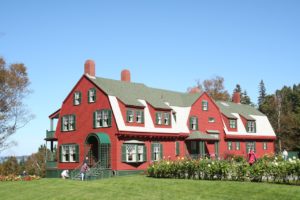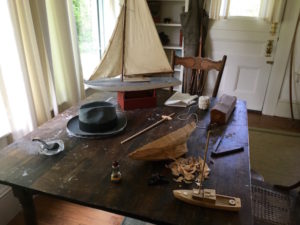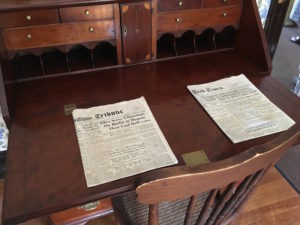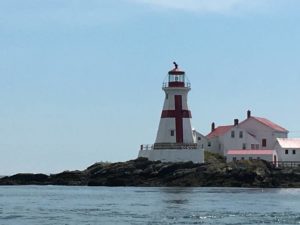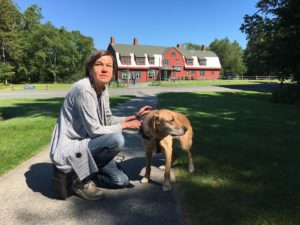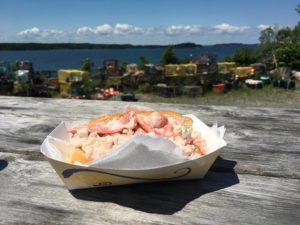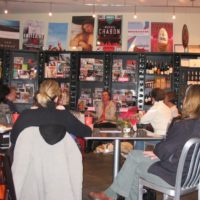Mondays with Mike: It started as just another walk
July 24, 2017 • 4 Comments • Posted in Mike Knezovich, Mondays with MikeOur friends Nancy and Steven (AKA Hanni’s people) were in town to see Hamilton this past weekend. If you haven’t noticed this yet, Beth kinda liked Hamilton. A close second to seeing Hamilton for Beth is seeing friends right after they’ve seen Hamilton, so she can get all giddy with them and talk about Hamilton.
So we met Nancy and Steven for a great Thai meal right after the Saturday matinee. At first, they were quiet—not because they didn’t like it, but because they were sort of stunned by how much they enjoyed the show. Steven, who shares my skepticism about pop phenomena, was especially surprised at how good it was. Nice to be surprised that way.
Gradually, though, Beth got her way and they were comparing notes about favorite moments. And I remain the only person I know who hasn’t seen it yet.
After dinner, we took a long walk starting with Millennium Park as our first destination. Chicago in summer is always bonkers in a happy way, and Saturday was particularly bonkers.
When we reached Millennium, we stopped to listen to the Grant Park Symphony perform some Broadway tunes with a couple of singers. The place was packed, and there was just a nice vibe.
Saturday night Millennium Park
From there, we crossed the serpentine bridge across Columbus Drive and landed in Maggie Daley Park. It has rock climbing walls and some terrific playground stuff for kids, and a ribbon of pavement that winds through—in winter it’s iced for skaters, but rollerbladers were out Saturday evening.
An area around Jackson Street in Grant Park—where the city puts on lots of its summer festivals—had been blocked off a day earlier. But I neglected to check what it was. So we meandered to Summerdance, where an absolutely terrific Salsa band was playing. I counted 12 musicians, including three violinists—which was unusual by the band leader’s own account (violins are expensive, he chuckled). Again, the place was packed, and remarkably diverse, and the crowd exuded a remarkably happy feeling.
From there, we sought to quench our thirsts. But as we headed west on Balbo, I saw mobs of people outside the Hilton, and across the street from the Hilton in front of the Merle Reskin Theater. This past weekend was the Blackhawks Convention at the Hilton, so at first I figured it had something to do with that. But as we got closer, it got weirder. Steven, who had asked questions about Maggie Daley Park and other sights along the way, asked, “Can you explain this one Mike?”
I couldn’t. These people were acting oddly. We had to dodge and weave to pass through them. They were all looking at their phones. And some had phones that were wired to backpacks.
And then Nancy figured it out: Pokemon Go. The area near Jackson had been blocked off for a special Pokemon Go event to commemorate its one-year anniversary. Apparently 20,000 Pokers convened. And apparently, initially anyway, they were very disappointed. A failure of servers or cell service—or both—made the start of it something of a fiasco, and Niantic, the game creator, issued refunds to anyone who asked.
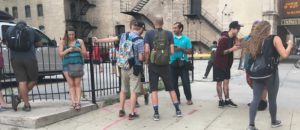
Even on Sunday, the Pokemon people were everywhere.
But they solved most of the problems later, and the mob we saw was out to collect whatever the hell you collect. Many had brought auxiliary batteries in their backpack.
We finally made it through the throng and I was relieved that we’d given Whitney the night off. She probably would’ve been stepped on more than once, and the Pokers were so enrapt that they didn’t even notice Beth’s white cane, which made for some interesting moments for me, the sighted guide.
We sought the shelter of one of our local watering holes on Dearborn. But no. Even more Pokers, on both sides of the street, and filling our little fountain park.
Eventually, we found seats at a place on Clark, where we ran into a couple of friends from the neighborhood.
When I started explaining about the Pokemon people, one of our friends immediately thought I was talking about the new Poke place that just opened our street. It took awhile to straighten all that out.
I mostly love my city in the summer, but every once in awhile, it’s like drinking from a fire hose.

